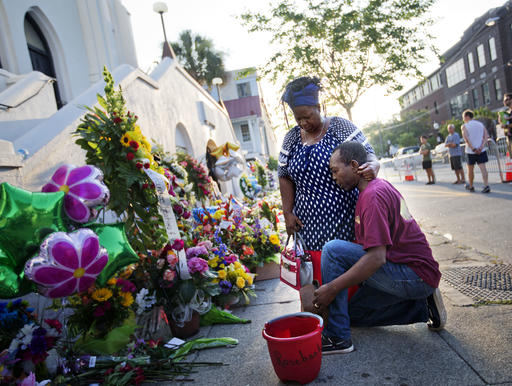CHARLESTON, S.C. (AP) — A survivor of the Charleston church slayings called 911 shortly after Dylann Roof opened fire and killed nine of her friends during a Bible study. Polly Sheppard’s call, played for jurors on Wednesday, starts with a prayer and a plea for help: “Please answer. Oh, God.”
When the recording ended, Sheppard staggered from the witness stand and several family members rushed to help her down the aisle and out of the courtroom as she stared blankly ahead.
Prosecutors rested their case in Roof’s federal death penalty trial and his lawyers called no witnesses after the judge ruled that mental health experts, job applications and his academic record were irrelevant to whether Roof is guilty of attacking the church. Roof’s attorneys have largely conceded there is no disputing the facts of the case and have instead tried to focus on whether he should face the death penalty or life in prison.
Roof, who is white, is charged with hate crimes in what prosecutors say was a racially motivated attack on nine black worshippers at Emanuel African Methodist Episcopal Church. Jurors will hear closing arguments Thursday.
In her testimony, Sheppard remembered something about each of the nine victims — how the Rev. Daniel Simmons was nicknamed “Dapper Dan” because of his fine hats and shiny shoes or how the bathrooms at the church didn’t have the same shine since Ethel Lance, who kept them tidy, was killed. There was a catch in her voice each time assistant U.S. Attorney Jay Richardson asked her to identify a dead friend and fellow worshipper.
Sheppard recalled what happened June 17, 2015, when Roof came into Wednesday night Bible study, took the lesson from the church’s pastor, the Rev. Clementa Pinckney, and sat down beside him quietly for 45 minutes. Her voice filled with sadness, unlike the prosecution’s opening witness — the only other adult survivor Felicia Sanders — whose voice had both sorrow and anger as she ended her testimony saying Roof deserved to be in the pit of hell.
Sheppard said she dove under a table when the first shots were fired. She heard boom after boom and watched shells fall to the floor as Roof’s black boots inched closer and closer. She prayed out loud. Roof stopped, pointed his .45-calibur Glock at her and told her to shut up, she said.
Roof asked if he had shot her yet. Sheppard said no. Roof said he wanted to leave her alive to tell the world why he attacked a historic African-American church.
“I have to. I have to,” Sheppard recalled Roof telling her. “You’re raping our women and taking over the nation.”
Roof then moved away. Sheppard grabbed Lance’s cellphone that tumbled near her and called 911. In between telling the operator what she knew, Sheppard prayed. “Help us, Lord. Please help us, Lord. Please Jesus, help us.”
Sheppard’s 911 call was the final evidence jurors heard before closing arguments Thursday morning.
If they find Roof guilty, those same jurors will return Jan. 3 to decide if he is put to death or gets life in prison.
Roof’s defense lawyers wanted to tell jurors about a hodgepodge of records that they said would define Roof’s mental state before the shootings. But U.S. District Judge Richard Gergel said since Roof was not judged insane at the time of the crime, his mental state had nothing to do with whether he was guilty.
Gergel said the defense was welcome to introduce that evidence in the penalty phase. But it’s not clear if jurors will hear it because Roof has indicated he will be his own lawyer during that phase of the trial.
Earlier Wednesday, a medical examiner showed jurors X-rays of each person killed, with black spots the size of a penny showing the bullets that remained inside of them.
Dr. Erin Presnell said many of the victims had several wounds to their arms. Several times, Presnell stepped down from the stand to show how someone with their arms pulled up tight against them could end up having a bullet enter and exit their bodies several times.
Other victims had shots closely clustered together as if the victims were still. Earlier, witnesses testified that some of the wounded tried to play dead.
___
Follow Jeffrey Collins on Twitter at http://twitter.com/JSCollinsAP . His work can be found at http://bigstory.ap.org/content/jeffrey-collins .
Copyright 2016 The Associated Press. All rights reserved. This material may not be published, broadcast, rewritten or redistributed.






